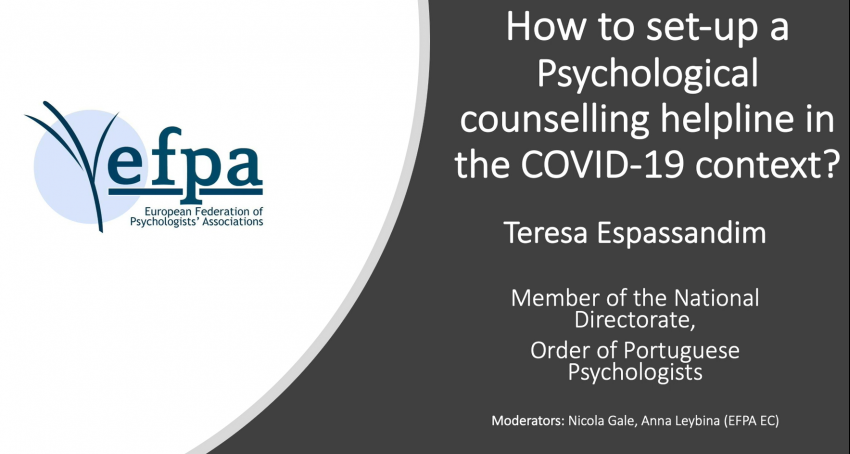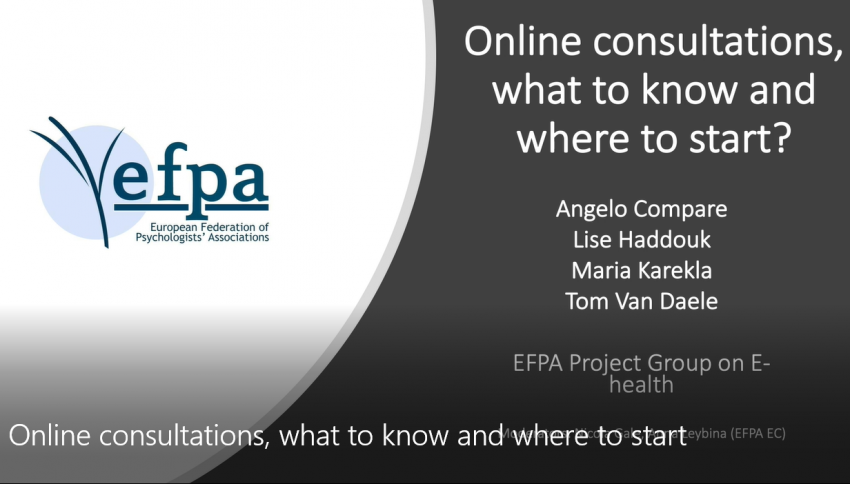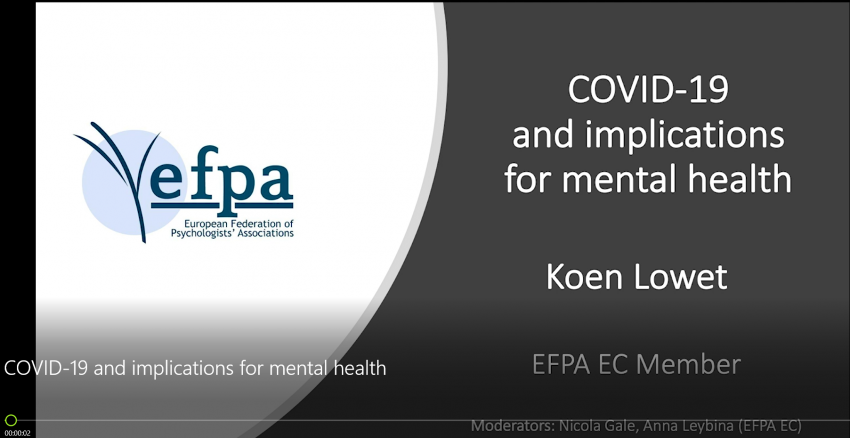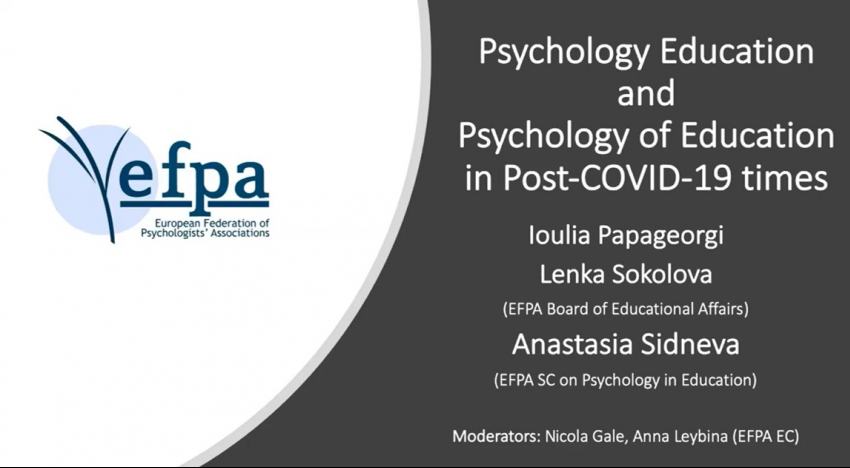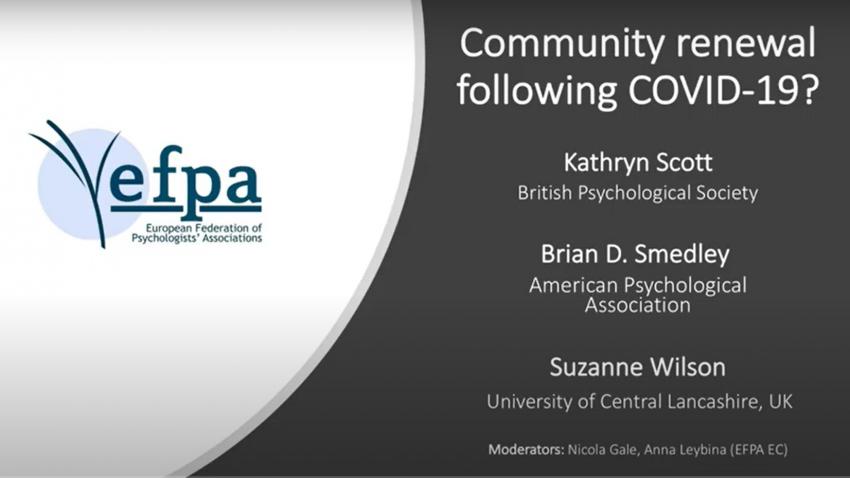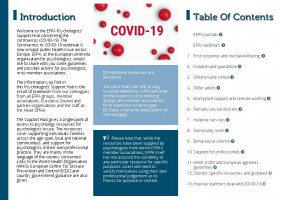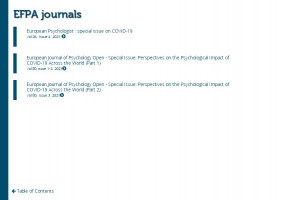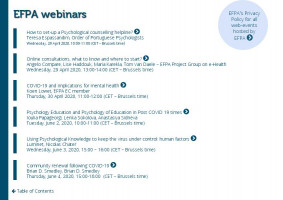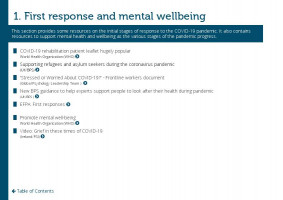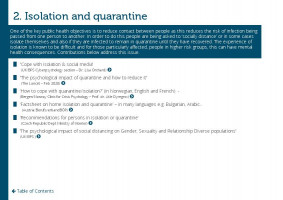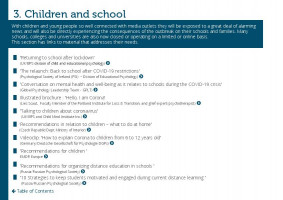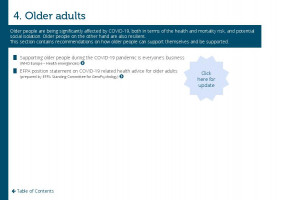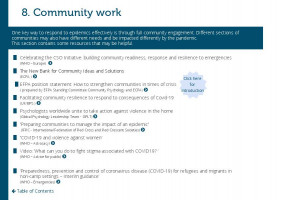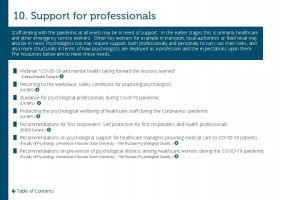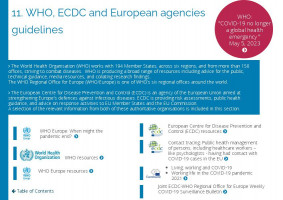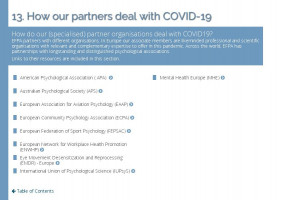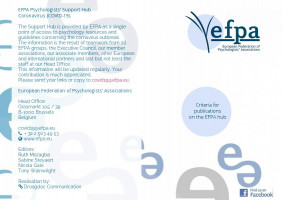How to set-up a Psychological counselling helpline?
Teresa Espassandim, Order of Portuguese Psychologists
Wednesday, 29 April 2020, 10:00-11:00 (CET – Brussels time)
EFPA Webinar: How to set-up a Psychological counseling helpline in the COVID-19 context?
Teresa Espassandim, Order of Portuguese Psychologists
Wednesday, 29 April 2020, 10:00-11:00 (CET – Brussels time)
This webinar hosted by Anna Leybina (EFPA Executive Council member) and moderated by Nicola Gale (EFPA Vice-president) focuses on:
Contextualization of the pandemic situation and the need for responses focused on emotional support and promoting psychological resilience;
Articulation with national health authorities and other partners;
Psychological intervention in crisis situations;
Technical requirements and training of Psychologists;
Psychological intervention protocol design and conception;
Technical and scientific supervision
Troubleshooting
Q&A
PowerPoint presentation can be downloaded here as PDF
View recorded video of the webinar hereunder
NB: There are subtitles in English, French, Italian, Spanish, and Russian are available. In order to access them click the settings button in the video (next to Youtube logo). Click subtitles and choose the language you prefer.
In case you feel it necessary that subtitles are provided in another language, please write to events@efpa.eu stating the title of a webinar, we will send you English version for translation and will later upload the subtitles to the system
Online consultations, what to know and where to start?
Angelo Compare, Lise Haddouk, Maria Karekla, Tom Van Daele – EFPA Project Group on e-Health
Wednesday, 29 April 2020, 13:00-14:00 (CET – Brussels time)
EFPA Webinar: Online consultations, what to know and where to start?
Angelo Compare, Lise Haddouk, Maria Karekla, Tom Van Daele – EFPA Project Group on e-Health
Wednesday, 29 April 2020, 13:00-14:00 (CET – Brussels time)
The COVID-19 pandemic crisis forces psychologists to take their consultations (partly) online, in order to continue to provide care. If you would like to know more about online treatment and the possibilities of online consultations, the Project Group on eHealth of the European Federation of Psychologists’ Associations organizes this free webinar.
During this 1-hour webinar hosted by Anna Leybina (EFPA Executive Council member) and moderated by Nicola Gale (EFPA Vice-president) participants have received a brief introduction on:
The known effectiveness of online consultations.
The benefits and pitfalls of online therapy.
How and what you need to get started with online therapy.
How to communicate online with your patients, plus concrete tips and tricks.
Q&A
PowerPoint presentation can be downloaded here as PDF
View recorded video of the webinar hereunder
NB: There are subtitles in English, French, Italian, Spanish, and Russian are available. In order to access them click the settings button in the video (next to Youtube logo). Click subtitles and choose the language you prefer.
In case you feel it necessary that subtitles are provided in another language, please write to events@efpa.eu stating the title of a webinar, we will send you English version for translation and will later upload the subtitles to the system
Also see EFPA website for FAQ on online consultations prepared by EFPA Project Group on e-Health
COVID-19 and implications for mental health
Koen Lowet, EFPA EC member
Thursday, 30 April 2020, 11:00-12:00 (CET – Brussels time)
EFPA Webinar: COVID-19 and implications for mental health
Koen Lowet, EFPA EC member
Thursday, 30 April 2020, 11:00-12:00 (CET – Brussels time)
This webinar hosted by Anna Leybina (EFPA Executive Council member) and moderated by Nicola Gale (EFPA Vice-president) talk about the impact of COVID-19 on the mental health status of our citizens and the implications for our mental health system. The webinar is based on the experiences that we’ve gathered so far from the Belgian situation and input we’ve received from our European and international colleagues. The webinar try to address the progressive implications following the timeline of the Pandemic for the different groups in our society such as the mental health patients, general public, families, caregivers, management and specific risk groups such as our elderly. This webinar is all about sharing experiences and knowledge accumulated so far and also gives time for Q&A.
PowerPoint presentation can be downloaded here as PDF
View recorded video of the webinar here
( Versions of video with subtitles in German, Italian, Spanish, Russian will be posted here when available.)
Psychology Education and Psychology of Education in Post COVID 19 times
Ioulia Papageorgi, Lenka Sokolova, Anastasiya Sidneva
Tuesday, June 2, 2020, 10:00-11:00 (CET – Brussels time)
- how psychology educators coped with this situation
- which technology and methods they used to teach psychology online
- which barriers and outcomes they experienced in this situation.
- present preliminary findings and discuss their implications.
- Discuss Issues and recommendations for home education during lockdown
- new: School education in COVID-19 settings from the position of CHAT (Cultural-Historical and Activity Approach)
This webinar is hosted by Anna Leybina (EFPA Executive Council member) and moderated by Nicola Gale (EFPA Vice-president).
View recorded video of the webinar hereunder
PowerPoint presentation will be soon availaible!
Using Psychological Knowledge to keep the virus under control: human factors
Luminet, Nicolas Chater
Wednesday, June 3, 2020, 15:00 – 16:00 (CET – Brussels time)
- recent research results on the respective role of sociodemographic, cognitive, and emotional factors that can facilitate or impair three health behaviours recommended to limit the spreading of the COVID-19 pandemic (hand-washing, limitation of public transports’ use and limitation of social contacts).
- What are the psychological factors that shaped how we have responded to the pandemics?
- What psychological principles will influence how our behaviour and our society is affected in the future, by the lock-down and social distancing measures beyond lockdown?
This webinar is hosted by Anna Leybina (EFPA Executive Council member) and moderated by Nicola Gale (EFPA Vice-president).
View recorded video of the webinar hereunder
PowerPoint presentation will be soon availaible!
Community renewal following COVID-19
Brian D. Smedley, Brian D. Smedley
Thursday, June 4, 2020, 15:00-16:00 (CET – Brussels time)
Community renewal following COVID-19
Thursday, June 4, 2020, 15:00-16:00 (CET – Brussels time)
Speakers:
Brian D. Smedley – Chief of Psychology in the Public Interest, American Psychological Association, US
Will be talking about
- connecting the voices of advocates working to address the needs of communities of color, people with disabilities, LGBTQ populations, and others;
- promoting policies that protect marginalized and vulnerable populations, such as economic, food, and housing assistance;
- marginalizing voices of intolerance that are resurgent with the pandemic spread; promotion of inclusive tolerant, equitable, and cohesive communities.
Kathryn Scott - Director of Policy at the British Psychological Society, UK
Kathryn will talk about what might be facing societies rebuilding in the context of Covid-19, what ‘the new normal’ might look like both short and long term, and what psychology indicates will be important. She will draw on her experience as a public health strategist, leading high-profile international campaigns, managing government relations and thought leadership programmes, and during Covid-19 as a member of one of the UK Government’s key scientific advisory committees.
Suzanne Wilson - Research fellow in social inclusion and community engagement School of Social Work, Care and Community at the University of Central Lancashire, UK
The ways communities respond to devastating events is influenced by the type of event and the characteristics of communities, and while trauma can help some communities pull together, in other cases, it can pull them apart. Most people have never experienced anything like COVID-19 in their lifetime and although the world has experienced viral outbreaks before it is very uncertain how communities will respond to the pandemic in the long-term. In her presentation, Suzanne Wilson will consider “community renewal” from a community psychology perspective, reflecting on ways that community identity may have been affected by the crisis, and how new forms of “mutuality” can help to build stronger, better connected communities.
This webinar is hosted by Anna Leybina (EFPA Executive Council member) and moderated by Nicola Gale (EFPA Vice-president).
View recorded video of the webinar hereunder
PowerPoint presentation will be soon availaible!
EFPA's Privacy Policy for all web-events hosted by EFPA
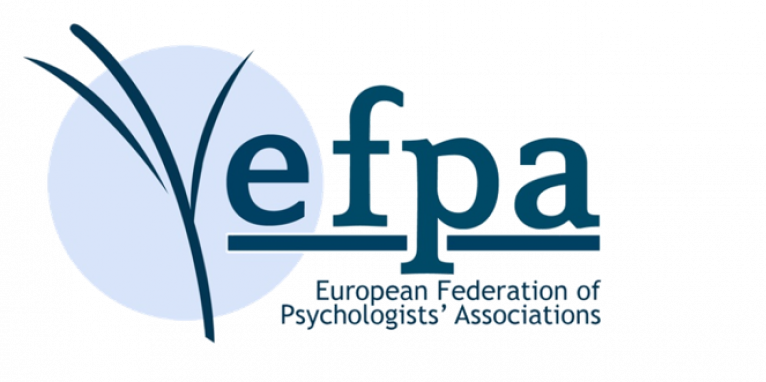
Privacy Policy
EFPA cares about your privacy and treats personal data with the strictest confidentiality and in accordance with the applicable legislation.
The purpose of this Privacy Policy is to provide you with transparent information about the processing of your data by EFPA in the context of our webinars, namely about the data we collect, the purpose, the way we use it, with whom we share it and the rights you have with regard to the processing of such data.
1. Who is responsible for the processing of your personal data?
The European Federation of Psychologists Associations, with registered office at Grasmarkt 105/39, 1000 Brussels, Belgium and registered in the Belgian Crossroads Bank for Enterprises under the number 0478.487.736 (hereinafter ‘EFPA’ or ‘we’) is responsible for the processing of personal data as described in this Privacy Policy. If you have any questions, please do not hesitate to contact us at events@efpa.eu
2. How do we collect your personal data, what personal data do we process about you and what do we use it for?
By filling in the webinar application form to register for one of our webinars, you directly provide EFPA with your personal data. We use your identification data (first name, family name, country, member association, organisation, position, email address) to communicate with you, to send you information directly related to the webinar you registered for and to provide you with the link of the recorded webinars available on the EFPA website afterwards. We will also send you information about specific EFPA activities which we believe may interest you. EFPA respects the privacy of personal email addresses. The objective is not to send you unwanted messages. All mailings sent to you offer the possibility to unsubscribe. Your personal data will be shared with our head office in Belgium. For any or more information about the processing of your personal data and the use of cookies by the platform used for this registration, SurveyMonkey, please refer to their privacy policy and cookie policy.
3. What are the legal bases for the processing?
By filling in the webinar application form to register for one of our webinars and, if the case may be, by checking the specific text box for future communications about specific EFPA activities which we believe may interest you, you explicitly consent with EFPA processing your personal data for the purposes mentioned in article 2.
4. How long do we keep your personal data?
We will retain your personal data for as long as this is necessary to achieve the purposes set out in Article 2. We will remove your personal data from our database as soon as we no longer need them to achieve these purposes or when you validly exercise the right to erase your personal data. Should you wish to know how long your personal data will be kept for specific processes, please contact us at events@efpa.eu
5. Whom do we share personal data with?
We do not sell, trade, or rent your personal data to others in the context of this Privacy Policy. Notwithstanding the foregoing, it is however possible that EFPA discloses your personal data to the competent authorities (i) if EFPA is obliged to do so under law or under legal proceedings and (ii) to safeguard and defend our rights.
6. How do we protect your personal data?
We are committed to protect the privacy of our data subjects. We are developing and working on strict privacy policies to preserve the confidentiality of the personal data you share with us and take all appropriate measures to ensure that our servers, to the extent possible, prevent unauthorized leaks, destruction, loss, disclosure, use, access or alteration of your data.
7. What are your rights and how can you exercise your rights?
Under the GDPR, you have the following rights with regard to your personal data:
- Right of access
- Right to rectification
- Right to erasure
- Right to restriction of processing
- Right to object
- Right to data portability
- Right to withdraw your consent
If you wish to exercise one of the above rights, you can send a written request by letter to EFPA head office at Grasmarkt 105/39, 1000 Brussels, Belgium or by email to headoffice@efpa.eu
We promise you an answer as soon as possible, at the latest one month after we have received your request. We make every effort to comply with all requests within one month. However, this period may be extended for reasons relating to the specific right or complexity of your request.
8. Right to file a complaint
Please note that you always have the right to lodge a complaint with the competent supervisory authority and to seek judicial remedy in relation with the processing of your personal data. For Belgium this is the Data Protection Authority, which can be reached by mail at Rue de la Presse 35, 1000 Brussels, and by email at the following address: contact@apd-gba.be.
For other countries of the EU you can find the list of data protection supervisory authorities here: http://ec.europa.eu/justice/data-protection/article-29/structure/data-protection-authorities/index_en.htm.
9. Revisions to our Privacy Policy
We reserve the right to revise this Privacy Policy or any part of it from time to time, in particular to comply with all new applicable laws and/or regulations, the recommendations of the authorities and the decisions of the courts in this area. Please review the Policy periodically for changes.
Last updated 28 April 2020
Table of Contents
